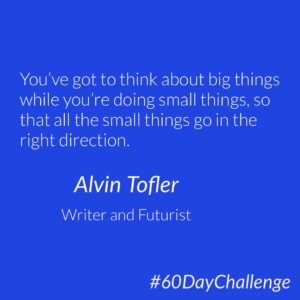 Welcome to Day #3 of the #60DayChallenge! See this post if you need to be brought up to speed!
Welcome to Day #3 of the #60DayChallenge! See this post if you need to be brought up to speed!
OK…let’s dive in…🌊🌊🌊
—–
I’ve always been curious about the future. I think it’s because I actually like change, and the future is really all about change. I’m certainly not an expert in futures thinking…but very curious.
Here is something that piques my curiosity about the future: Those students that began Kindergarten this school year (2020) will graduate (assuming K12 institutions are still largely functioning in the same manner) in 2033.
2033! Think about the world these young people will be entering in 2033.
How will technology, democracy, the environment, the world of work, and longevity evolve over that DECADE+? Where will we be with all the global challenges represented by the United Nations Sustainable Development Goals (SDGs)?
When we craft our district or school “strategic plans,” are we informing those plans with how change might occur outside of education and our school communities? Do we take the longview? Looking out to that year 2033? 🤔🤔🤔
I’m going to venture a guess….mostly not.
But… as we work to transform our education and schooling systems to reflect a more human-centered approach, should we not be considering signals, trends and events that may act as accelerants or limiters to our visions and models of learning?
Strategic foresight is an actual discipline that many domains use to plan for the future of their organizations. Foresight involves analyzing trends, events and issues to identify drivers that can be used to design probable, possible and preferred futures.
In the K12 space, KnowledgeWorks is the most notable futures group with over 20 years of forecasts, the most recent Navigating the Future of Learning Forecast 5.0.
Five drivers (some obvious and some not-so-obvious) are identified in Forecast 5.0:
- Automating Choices: Artificial intelligence and algorithms are automating many aspects of our lives
- Civic Superpowers: Engaged citizens and civic organizations are seeking to rebalance power
- Accelerating Brains: People have increasing access to tools and insights that are reshaping our brains in intended and unintended ways
- Toxic Narratives: Outdated and misaligned systems and metrics of success are contributing to chronic health issues, including rising rates of mental illness among children
- Remaking Geographies: Communities are working to remake themselves in the face of deep transitions
—–
❓ Provocations:
If the drivers are based on current trends, events and issues, how are we doing preparing kids for today and tomorrow? How do you think the drivers can inform our efforts to transform schools into more human-centered communities of learning? How does strategic foresight challenge our mental models of strategic planning? How about questions floating around in your mind at the moment? Any additional resources?
💎 Resource:
Navigating the Future of Learning Forecast 5.0 from KnowledgeWorks
🧠 Mindset:
Longview planning for change
💡 Area:
Longview (strategic foresight)
📣 Drop your thoughts in the comments or in the Facebook group. 🔥🔥🔥
- A silver lining - January 22, 2022
- Is our use of tech working against us? 🤔 - September 8, 2021
- What’s NOT going to change in the next 10 years? 🤔 - September 7, 2021